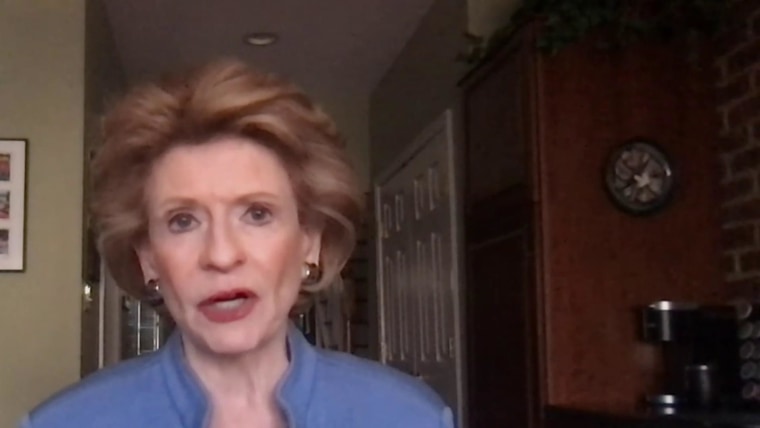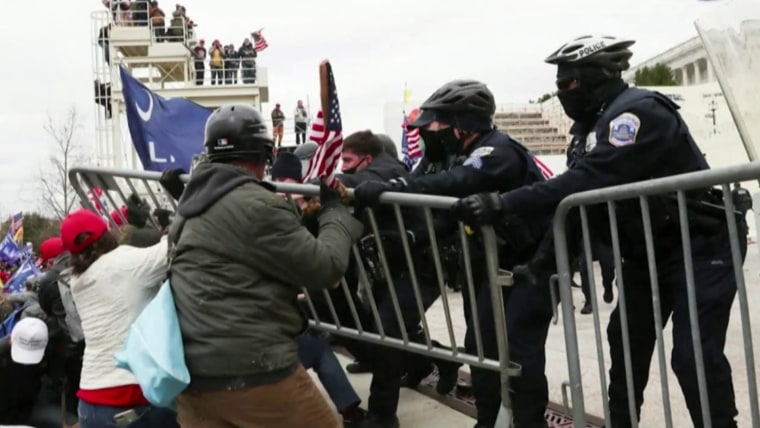Police have enough power. The Capitol riots shouldn't give them more.
“In the country with the highest incarceration rates in the world, in which carceral punishment is often one of the only areas of bipartisan agreement and the criminalization of any number of human behaviors is as natural as breathing, it seems to make sense that the solution to a moment of mass trauma and upheaval is to increase the scope and powers of law enforcement yet again.
In the aftermath of the riot at the U.S. Capitol, we've seen a long-building, entirely public case for law enforcement's unique unsuitability to address white-supremacist extremism.
But in the aftermath of the riot at the U.S. Capitol on Jan. 6, we've also been witness to a long-building, entirely public case for law enforcement's unique unsuitability to address white-supremacist extremism plaguing the U.S. In the wake of the riot, when a volatile mixture of radicalized Trump supporters, militia members, neo-Nazi extremists and white vigilantes stormed the seat of government in hope of inflicting violence on lawmakers, many commentators have pressed for new federal laws cracking down on domestic terrorism, for broad revivification of the charge of "seditious conspiracy" and for more resources to be poured into the U.S.'s massive surveillance state to clamp down on white extremists.
It's not just theoretical, either: In Florida, Mississippi and Indiana, The Intercept has reported, legislatures have begun to further criminalize protest, introducing draconian new anti-protest laws. Originally designed to counter Black Lives Matter protests, these bills have been hastily repurposed after Jan, 6 while increasing dependence on police forces. Eight other states have such legislation pending.
But as the past five years illustrate, the issue isn't a lack of laws addressing domestic extremism. It's a lack of will from law enforcement and inconsistent enforcement of existing law. Reinforcing the false sense that law enforcement is politically neutral by granting it even more money and power would be counterproductive to preventing a further rending of the country's social fabric.
Neither federal officials nor local police made the rise of a highly visible, violent, far-right national gang an enforcement priority.
During the Trump era, the animus between police forces and left-wing protesters was clear. So was law enforcement's unwillingness to crack down on right-wing extremists while meting out harsh punishments and violence on a broad spectrum of left-wing protesters. In an analysis of 13,000 protests, the US Crisis Monitor, a nonprofit political violence analysis group, found that police were three times more likely to engage in violent tactics like beating and using gas against left-wing protesters than right-wing protesters.
One piquant example of right-wing agitators' skirting existing laws is the rise of the Proud Boys, a militant group with white nationalist ties founded in 2017. Over the next three years, the Proud Boys engaged in violent melees across the country, from Portland, Oregon, to New York City. The deadly Unite the Right rally in Charlottesville, Virginia, was organized by Jason Kessler, a Proud Boys member. Despite repeated felony assaults by members and founder Gavin McInnes' repeated statements that the Proud Boys are a "gang," existing gang enhancement laws weren't used to increase charges against members of the "Western chauvinist" organization.
The group was a prominent, bellicose faction of the "Stop the Steal" pro-Trump protests in Washington, D.C., in November and December, engaging in street violence against passersby and counterprotesters, including multiple stabbings. Despite the openly violent nature of the organization and its fast-increasing popularity, neither federal officials nor local police made the rise of a highly visible, violent, far-right national gang an enforcement priority. On the contrary, in Philadelphia last year, members of the Philadelphia Fraternal Order of Police union openly mingled with the group at a bar, and the Philadelphia Police Department provided a demonstrably friendly "escort" to a caravan of Proud Boys demonstrating in the city.
Indeed, as federal and local law enforcement agencies cracked down against racial justice protesters in the wake of George Floyd's death, right-wing groups organized competing pro-police "Back the Blue" rallies around the country, which officers attended with pride and gratitude.
Even in the wake of the Capitol riot, with its stark images and multiple deaths, the undeniable affinity between police and the far right in the U.S. retained its potency.
"It's nice to feel appreciated once in a while," the sheriff of Wallowa County, Oregon, said of a rally where multiple Proud Boys flags were flown in support of police. During the George Floyd protests, Albuquerque, New Mexico, police referred to members of the New Mexico Civil Guard militia as "heavily armed friendlies," Chicago police were reported to have fraternized with white mobs holding bats during Black Lives Matter Protests, and during unrest in Kenosha, Wisconsin, police handed out water bottles and friendly greetings to white vigilantes who self-deputized to patrol the streets — culminating in the shooting of two protesters by illegally armed teenager Kyle Rittenhouse, who has been anointed a hero on the right. (Rittenhouse is the subject of a new arrest warrant after he failed to update Wisconsin authorities about a change of address — a failure that Rittenhouse's legal team said was the suggestion of "a high-ranking member of the Kenosha Police Department.")
Even in the wake of the Capitol riot, with its stark images and multiple deaths, the undeniable affinity between police and the far right in the U.S. retained its potency. The day after the storming, Chicago Fraternal Order of Police President John Cataranza — who represents 12,000 rank-and-file police officers — downplayed the violence in a radio interview, depicting the rioters as " a bunch of pissed-off people that feel an election was stolen" and adding that their worst crime was "trespassing." (Reminder: A police officer died of his injuries after he was bludgeoned.)
And let's not forget that dozens of current police officers were among the crowd that breached the Capitol or the attendees at the pro-Trump rally that preceded it. Two Rocky Mount, Virginia, police officers were fired after they took selfies inside the Capitol. The Seattle Police Department, meanwhile, is investigating the presence of multiple officers in Washington.
The fact is that those who are most likely to face prosecution under any new anti-protest laws or domestic terrorism statutes are those who are already law enforcement's preferred targets: organizers for social justice and minorities. Likewise, to suggest that the same police forces that have willingly deputized members of the armed far-right fringe — and who have fought alongside them — will become the instruments of its dismantling overnight is more than just naiveté; it is a wanton, willful blindness to law enforcement's place in this country's politics.
In lieu of a slate of new laws that would only victimize law enforcement's traditional targets more efficiently — while leaving far-right extremism intact and thriving — we must find ways to combat the rise of the far right without resorting to a swollen, unaccountable police corps that will never be willing to address the problem that has metastasized within its own ranks. It is obvious that a mass deradicalization of the police is necessary, very much including a thinning-out of forces rife with extremists. There is also a civil necessity to mobilize communities across the country against racism, white supremacy and antidemocratic violence.
Providing more funding and more political cover to law enforcement is to fight fire with fire. Anyone opposed to the rise of white extremism is a potential victim of the resulting inferno.“


No comments:
Post a Comment